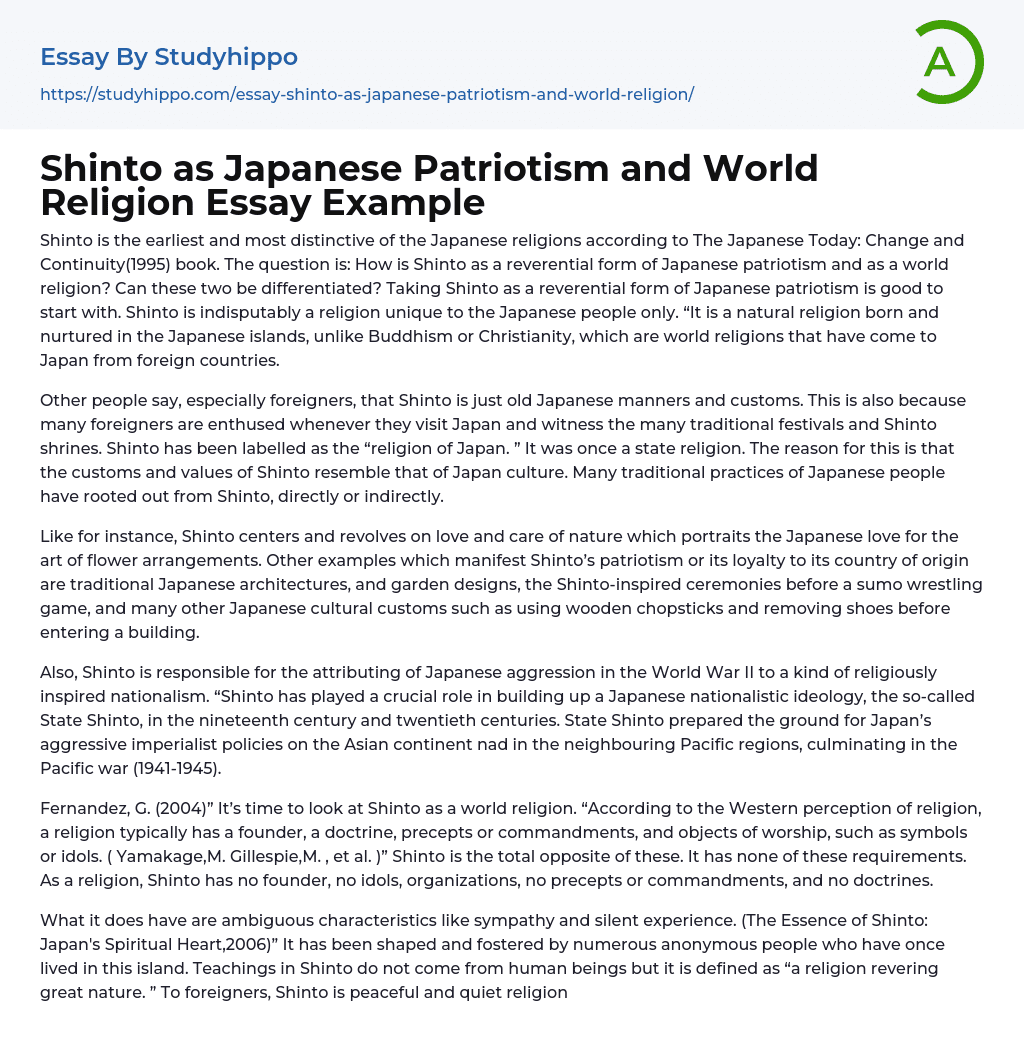

Shinto as Japanese Patriotism and World Religion Essay Example
Shinto is the earliest and most distinctive of the Japanese religions according to The Japanese Today: Change and Continuity(1995) book. The question is: How is Shinto as a reverential form of Japanese patriotism and as a world religion? Can these two be differentiated? Taking Shinto as a reverential form of Japanese patriotism is good to start with. Shinto is indisputably a religion unique to the Japanese people only. “It is a natural religion born and nurtured in the Japanese islands, unlike Buddhism or Christianity, which are world religions that have come to Japan from foreign countries.
Other people say, especially foreigners, that Shinto is just old Japanese manners and customs. This is also because many foreigners are enthused whenever they visit Japan and witness the many traditional festivals and Shinto shrines. Shinto has been labelled as the “religion of Japa
...n. ” It was once a state religion. The reason for this is that the customs and values of Shinto resemble that of Japan culture. Many traditional practices of Japanese people have rooted out from Shinto, directly or indirectly.
Like for instance, Shinto centers and revolves on love and care of nature which portraits the Japanese love for the art of flower arrangements. Other examples which manifest Shinto’s patriotism or its loyalty to its country of origin are traditional Japanese architectures, and garden designs, the Shinto-inspired ceremonies before a sumo wrestling game, and many other Japanese cultural customs such as using wooden chopsticks and removing shoes before entering a building.
Also, Shinto is responsible for the attributing of Japanese aggression in the World War II to a kind of religiously inspired nationalism. “Shinto has played a crucial role i
building up a Japanese nationalistic ideology, the so-called State Shinto, in the nineteenth century and twentieth centuries. State Shinto prepared the ground for Japan’s aggressive imperialist policies on the Asian continent nad in the neighbouring Pacific regions, culminating in the Pacific war (1941-1945).
Fernandez, G. (2004)” It’s time to look at Shinto as a world religion. “According to the Western perception of religion, a religion typically has a founder, a doctrine, precepts or commandments, and objects of worship, such as symbols or idols. ( Yamakage,M. Gillespie,M. , et al. )” Shinto is the total opposite of these. It has none of these requirements. As a religion, Shinto has no founder, no idols, organizations, no precepts or commandments, and no doctrines.
What it does have are ambiguous characteristics like sympathy and silent experience. (The Essence of Shinto: Japan's Spiritual Heart,2006)” It has been shaped and fostered by numerous anonymous people who have once lived in this island. Teachings in Shinto do not come from human beings but it is defined as “a religion revering great nature. ” To foreigners, Shinto is peaceful and quiet religion dealing with nature alone and not of the afterlife. It focuses more on how one will fit in the world in the present.
- Puritans essays
- Afterlife essays
- Buddhism essays
- Christianity essays
- Deism essays
- Faith essays
- God essays
- Hinduism essays
- Islam essays
- Jews essays
- Judaism essays
- Monotheism essays
- New Testament essays
- Ritual essays
- Sin essays
- Soul essays
- Theology essays
- Confession essays
- Devil essays
- Miracle essays
- Monk essays
- Revelation essays
- Atheism essays
- Immortality essays
- Jainism essays
- Sinners essays
- Bible essays
- Old Testament essays
- Salvation essays
- Temple essays
- Taoism essays
- Pilgrimage essays
- Freedom Of Religion essays
- Existence of God essays
- Christian Worldview essays
- Cosmological Argument essays
- Gautama Buddha essays
- Karma essays
- Buddha essays
- Baptism essays
- Holy Spirit essays
- Jesus Christ essays
- Adam And Eve essays
- Crucifixion Of Jesus essays
- Crusades essays
- Eucharist essays
- God The Father essays
- Pope essays
- Protestantism essays
- Christian essays



